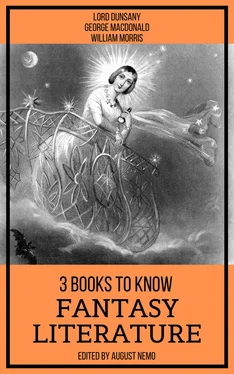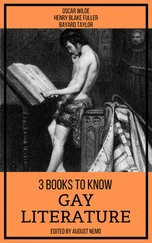1 ...8 9 10 12 13 14 ...32 And then the troll thought of the weed-green tarns of Elfland in the woods that the trolls knew; he thought of the wonder of the unwithering flowers that time has never touched; the deep, deep colour and the perpetual calm: his errand was over and he was weary of Earth.
For a moment nothing moved there but the baby, shouting for new troll antics and waving his arms: Lirazel stood with the elfin scroll in her hand, the troll knelt before her, the witch never stirred, the cat stood watching fiercely, even the clock was still. Then the Princess moved and the troll rose to his feet, the witch sighed and the cat gave up her watchfulness as the troll scampered away. And though the baby shouted for the troll to return it never heeded, but twisted down the long spiral stairs, and slipping out through a door was off towards Elfland. As the troll passed over the threshold the wooden clock ticked again.
Lirazel looked at the scroll and looked at her boy, and did not unroll the parchment, but turned and carried it away, and came to her chamber and locked the scroll in a casket, and left it there unread. For her fears told her well the most potent rune of her father, that she had dreaded so much as she fled from his silver tower and heard his feet go booming up the brass, had crossed the frontier of twilight written upon the scroll, and would meet her eyes the moment she unrolled it and waft her thence.
When the rune was safe in the casket she went to Alveric to tell him of the peril that had come near her. But Alveric was troubled because she would not name the baby, and asked her at once about this. And so she suggested a name at last to him; and it was one that no one in these fields could pronounce, an elvish name full of wonder, and made of syllables like birds' cries at night: Alveric would have none of it. And her whim in this came, as all the whims she had, from no customary thing of these fields of ours, but sheer over the border from Elfland, sheer over the border with all wild fancies that rarely visit our fields. And Alveric was vexed with these whims, for there had been none like them of old in the Castle of Erl: none could interpret them to him and none advise him. He looked for her to be guided by old customs; she looked only for some wild fancy to come from the south-east. He reasoned with her with the human reason that folk set much store by here, but she did not want reason. And so when they parted she had not after all told anything of the peril that had sought her from Elfland, which she had come to Alveric to tell.
She went instead to her tower and looked at the casket, shining there in the low late light; and turned from it and often looked again; while the light went under the fields and the gloaming came, and all glimmered away. She sat then by the casement open towards eastern hills, above whose darkening curves she watched the stars. She watched so long that she saw them change their places. For more than all things else that she had seen since she came to these fields of ours she had wondered at the stars. She loved their gentle beauty; and yet she was sad as she looked wistfully to them, for Alveric had said that she must not worship them.
How if she might not worship them could she give them their due, could she thank them for their beauty, could she praise their joyful calm? And then she thought of her baby: then she saw Orion: then she defied all jealous spirits of air, and, looking toward Orion, whom she must never worship, she offered her baby's days to that belted hunter, naming her baby after those splendid stars.
And when Alveric came to the tower she told him of her wish, and he was willing the boy should be named Orion, for all in that valley set much store by hunting. And the hope came back to Alveric, which he would not put away, that being reasonable at last in this, she would now be reasonable in all other things, and be guided by custom, and do what others did, and forsake wild whims and fancies that came over the border from Elfland. And he asked her to worship the holy things of the Freer. For never had she given any of these things their due, and knew not which was the holier, his candlestick or his bell, and never would learn for ought that Alveric told her.
And now she answered him pleasantly and her husband thought all was well, but her thoughts were far with Orion; nor did they ever tarry with grave things long, nor could tarry longer amongst them than butterflies do in the shade.
All that night the casket was locked on the rune of the King of Elfland.
And next morning Lirazel gave little thought to the rune, for they went with the boy to the holy place of the Freer; and Ziroonderel came with them but waited without. And the folk of Erl came too, as many as could leave the affairs of man with the fields; and all were there of those that had made the parliament, when they went to Alveric's sire in the long red room. And all of these were glad when they saw the boy and marked his strength and growth; and, muttering low together as they stood in the holy place, they foretold how all should be as they had planned. And the Freer came forth and, standing amongst his holy things, he gave to the boy before him the name of Orion, though he sooner had given some name of those that he knew to be blessed. And he rejoiced to see the boy and to name him there; for by the family that dwelt in the Castle of Erl all these folk marked the generations, and watched the ages pass, as sometimes we watch the seasons go over some old known tree. And he bowed himself before Alveric, and was full courteous to Lirazel, yet his courtesy to the princess came not from his heart, for in his heart he held her in no more reverence than he held a mermaid that had forsaken the sea.
And the boy came even so by the name of Orion. And all the folk rejoiced as he came out with his parents and rejoined Ziroonderel at the edge of the holy garden. And Alveric, Lirazel, Ziroonderel and Orion all walked back to the castle.
And all that day Lirazel did nothing that caused anybody to wonder, but let herself be governed by custom and the ways of the fields we know. Only, when the stars came out and Orion shone, she knew that their splendour had not received its due, and her gratitude to Orion yearned to be said. She was grateful for his bright beauty that cheered our fields, and grateful for his protection, of which she felt sure for her boy, against jealous spirits of air. And all her unsaid thanks so burned in her heart that all of a sudden she rose and left her tower and went out to the open starlight, and lifted her face to the stars and the place of Orion, and stood all dumb though her thanks were trembling upon her lips; for Alveric had told her one must not pray to the stars. With face upturned to all that wandering host she stood long silent, obedient to Alveric: then she lowered her eyes, and there was a small pool glimmering in the night, in which all the faces of the stars were shining. "To pray to the stars," she said to herself in the night, "is surely wrong. These images in the water are not the stars. I will pray to their images, and the stars will know."
And on her knees amongst the iris leaves she prayed at the edge of the pool, and gave thanks to the images of the stars for the joy she had had of the night, when the constellations shone in their myriad majesty, and moved like an army dressed in silver mail, marching from unknown victories to conquer in distant wars. She blessed and thanked and praised those bright reflections shimmering down in the pool, and bade them tell her thanks and her praise to Orion, to whom she might not pray. It was thus that Alveric found her, kneeling, bent down in the dark, and reproached her bitterly. She was worshipping the stars, he said, which were there for no such purpose. And she said she was only supplicating their images.
We may understand his feelings easily: the strangeness of her, her unexpected acts, her contrariness to all established things, her scorn for custom, her wayward ignorance, jarred on some treasured tradition every day. The more romantic she had been far away over the frontier, as told of by legend and song, the more difficult it was for her to fill any place once held by the ladies of that castle who were versed in all the lore of the fields we know. And Alveric looked for her to fulfil duties and follow customs which were all as new to her as the twinkling stars.
Читать дальше












